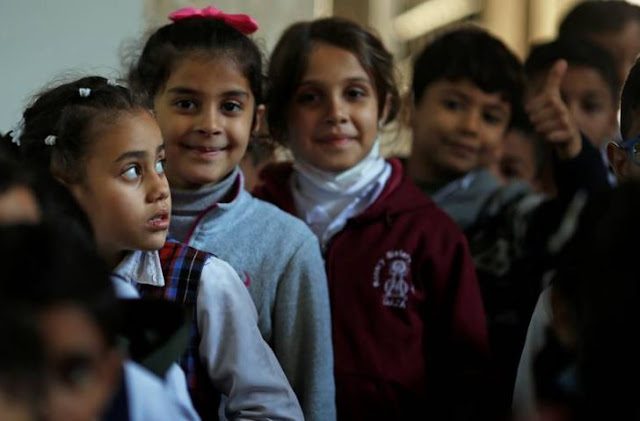World Bank approves $20m funding for Palestinian education sector
The World Bank approved an investment of $20 million into the Palestinian education sector as part of its multiphase programmatic approach (MPA) to support an eight-year scheme that addresses key education challenges in occupied West Bank and Gaza.
The 'Supporting an Education Reform Agenda for improving Teaching, Assessment and Career Pathways' programme (Seratac) seeks to improve education outcomes of primary and secondary students and increase student pathways leading to tertiary education.
While Palestinian children can, on average, expect to complete 12.2 years of schooling, they are only learning the equivalent of eight years, the World Bank said in a statement on Monday.
Seratac, which has an overall envelope of $60m, aims to tackle the root causes of poor quality education through a long-term, systemic approach.
“We are proud to adopt a long-term investment in the Palestinian education sector, the first multiphase programmatic approach in the education sector at the World Bank," said Kanthan Shankar, World Bank country director for occupied West Bank and Gaza.
"Not only does it ensure a nationwide visible impact on learning outcomes, but it also provides equal opportunity for every child performing below grade level. Through this progressive education reform agenda, we share the common goal with the Palestinian Authority to develop and unlock the full potential of its human capital."
The Covid-19 pandemic hit the education sector in Palestine hard, with access worsening for all the 1.3 million students, the World Bank said in a separate report.
"E-learning channels leave behind the most vulnerable children, and therefore the ministry adopted the cohort system dividing students into two small groups to receive face-to-face instruction at school at least three times per week," it said.
In October, the United Nations Relief and Works Agency for Palestine Refugees in the Near East (Unrwa), which supports the education of children in schools, appealed for $120m in funding to keep 550,000 children in school, provide health care and pay salaries for its 28,000 staff members.
The education sector needs an "extended engagement to fulfill the promise of human capital", the World Bank report added.
Seratac will support the Ministry of Education’s efforts to raise foundational skills of Palestinian primary school students through improvements to early grade Arabic language arts instruction (reading, writing, speaking, and listening) in Grades 1 to 4 and the promotion of positive school and classroom climates.
The programme will also strengthen students’ science, technology, engineering and maths (Stem) skills through improved pre-service and in-service teacher training and the roll-out of an adaptive learning initiative.
It will also develop a career guidance system to help secondary school students make informed career choices.
“Gradually, these components will build toward the long-term vision of Seratac: a first cohort of Palestinian students who have completed a cursus of high-quality general education and is ready to enter the labour market or tertiary education on a strong footing. Education should be a race where everyone wins,” said Samira Nikaein Towfighian, World Bank senior economist and co-task team leader.
 |
| Palestinian students in Gaza City. While Palestinian children can expect to complete 12.2 years of schooling, they are only learning the equivalent of eight years, says World Bank. |
Seratac will also strengthen the Palestinian student assessment system to gradually reform the secondary school leaving examination (Tawjihi) and create a more "inclusive pathway to tertiary education, including technical vocational colleges", the statement said.
“After a decade-long absence from international large-scale assessments, West Bank and Gaza will be able to construct comparable trends in Palestinian student learning outcomes over time that continuously inform policymaking and provide essential information on which to base decisions regarding school and system improvement, focused on the central goal of student learning”, said Samira Ahmed Hillis, World Bank programme leader for human development and co-task team leader.
Palestine's economy is largely dependent on foreign aid and grants and in May last year, the World Bank approved a $30m development policy grant to support digital initiatives in the country to strengthen its economy and improve governance.
Earlier this month, the International Monetary Fund said that Palestine's economy is recovering from the pandemic-induced recession and grew an estimated 6 per cent in 2021 overall. But the economy in Gaza, which is under an Israeli blockade, is estimated to have grown by just 2 per cent.
Despite the recovery, Palestine's gross domestic product is projected to reach its pre-pandemic level only by the end of 2023, because the economy faces a "fiscal crisis", the IMF said.
Comments
Post a Comment